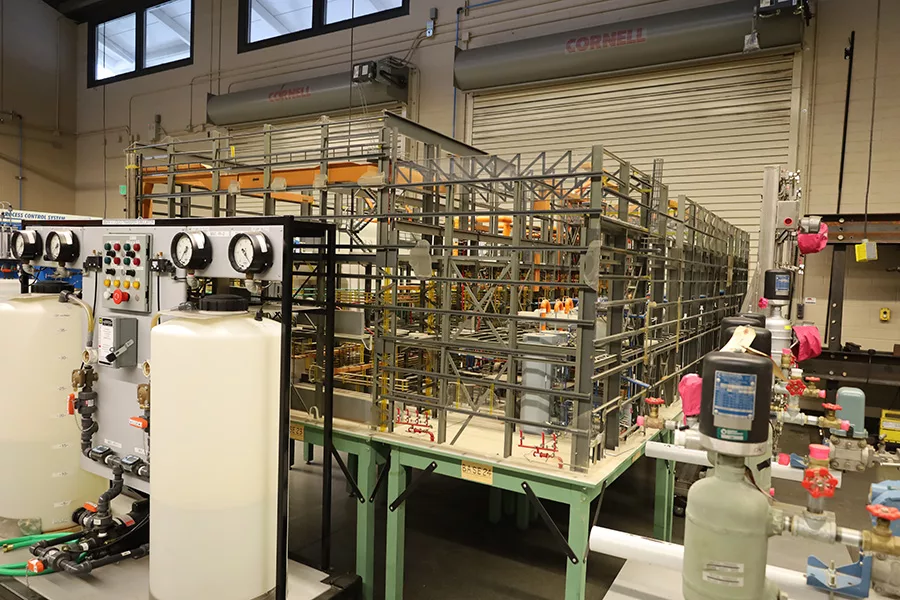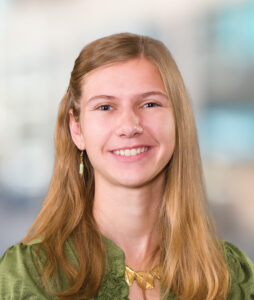
Home » $2 million grant to fuel Tri-Cities’ clean energy workforce pipeline
Future workforce
$2 million grant to fuel Tri-Cities’ clean energy workforce pipeline

Columbia Basin College’s Clean Energy Learning Center will work in tandem with the school’s Nuclear Technology Program to increase outreach about opportunities in clean energy. Above is a nuclear reactor model in CBC’s nuclear technology lab.
Photo by Rachel VisickJanuary 16, 2025
As the Tri-Cities works to position itself as a clean energy hub, a new college program aims to help fill the workforce pipeline that’s necessary to turn this vision into a reality.
Columbia Basin College in Pasco recently received a $2 million grant from the U.S. Department of Energy to establish a Clean Energy Learning Center.
Energy Northwest is a subsidiary grant recipient and will be involved in helping to mentor CBC students and connect them with internships.
With a rising demand to meet new clean energy initiatives and a surge of people retiring from the workforce, programs to train the next generation of workers are key.
“This collaboration could not have come at a better time,” said Sarah Fussner, director of Energy Northwest’s Public Power Internship Program.
Building awareness
The new center will work in tandem with CBC’s existing Nuclear Technology Program to increase outreach about opportunities in clean energy to both CBC students and middle and high school students.
CBC’s Nuclear Technology Program features three pathways to Associate in Applied Science degrees: radiological protection technology, instrumentation and control technology, and a non-licensed nuclear operator.
“Most of the students that have been part of the program are (there) because they know someone out in the area,” said Jesus Mota, CBC’s dean for Career and Technical Education.
The new center will help boost awareness about the program and help prepare more students for post-graduate work. Already, many of the nuclear technology students work at Energy Northwest, Pacific Northwest National Laboratory or Hanford contractors after completing the program.
Under the Department of Energy grant, a full-time director will be hired, as well as a part-time assistant director and a tenure-track faculty member. The program also will launch a new course, an introduction to clean energy class, available for any CBC student to take.
Mota said the course likely will launch this fall, addressing possible career paths and ways to contribute to clean energy in the future.
The college is already searching for a director and assistant director. A post will be up soon seeking the faculty member, Mota said.
While the Tri-Cities area has great research into clean energy futures, “our focus is really about the workforce,” Mota said.
Internships and mentorship
Energy Northwest will have a director on its end as well to help coordinate internships and a new mentorship program.
Fussner will take on that leadership role.
The partnership allows CBC to do theoretical teaching, while Energy Northwest supplies opportunities for hands-on learning, she said.
Energy Northwest typically recruits between 15 and 30 interns per year, depending on department budgets and availability. Fussner said they hope to increase the number of interns by 20% through the grant and partnership with CBC.
One part of this is expanding the Public Power Internship Program, an existing workforce development program where utilities hire interns which participate in workshops and field trips coordinated by Energy Northwest. The program will expand to include more organizations and broader industry training, Fussner said.
Energy Northwest’s 12-week long internal internship program is also undergoing development. The goal is to pair students with a different mentor every two weeks to give them a broad idea of what goes on in different departments, Fussner said.
On the mentorship side, CBC students who are a part of the clean energy program will be able to participate in quarterly workshops with subject matter experts at Energy Northwest. They’ll cover clean energy projects including solar, wind and hydropower, as well as advanced nuclear projects.

The Clean Energy Learning Center will focus on growing the clean energy work force, from offering students hands-on experiences and internships to giving them a boost on math requirements and an introductory course. Above is training equipment for CBC’s instrumentation and control program.
| Photo by Rachel VisickGrowing the workforce
The goal of these initiatives, Fussner said, is to create the workforce needed to meet all of the rapid changes happening in the industry. “In order to do that successfully, we have to have our hands in it and help mold and create those workforce professionals that we need,” she said.
Part of CBC’s outreach is building awareness in other fields, such as cybersecurity, engineering and business, which are vital to the nuclear industry, as well as helping to reach undecided students.
“Obviously there’s a demand for folks,” Mota said. “So then, how do we get more people on the inside, on that funnel to be able to begin the program?”
College students aren’t the only focus of the Clean Energy Learning Center either.
The new director, assistant and faculty member also will work to engage students at the middle school and high school level with events, workshops and field trips, giving them hands-on experiences, Mota said.
“We already do some of that stuff,” he said, “but basically this center will be created and that will be their specialty.”
If local school districts are interested, Mota said they could train teachers to offer the introduction to clean energy course in high schools and offer dual credit for it.
“We’re really excited to be able to partner with CBC and get into the high schools and hopefully the middle schools at the same time,” Fussner said.
Energy Northwest will host a Clean Energy Week in the spring, featuring subject matter experts and educational speakers. The program was piloted last year with the Pasco School District and is available this year to the Richland and Kennewick school districts as well.
A leg up in math
As part of the Clean Energy Learning Center, a new math bridge program will be available at CBC this summer. It’s designed to help remove barriers to students participating in the program by giving them a leg up on math requirements.
The nuclear technology program currently has capacity for 24 students, which the school hopes to expand to 72. Helping more students to meet the math prerequisites will help reach that goal.
As the nuclear lab for the tech program is rebranded as part of the Clean Energy Learning Center, Mota anticipates buying instrumentation and radiation protection equipment as part of the grant to give the students more hands-on experience.
Under a different grant, CBC is also working to buy a small modular nuclear reactor simulator as part of Energy Northwest’s partnership with Amazon and X-energy. Housed by agreement at the Institute for Northwest Energy Futures on the Washington State University Tri-Cities campus, the simulator will benefit CBC, WSU and Energy Northwest.
The grant has been awarded, Mota said, and all that remains is to purchase and install the simulator.
Local News Education & Training Energy Labor & Employment
KEYWORDS January 2025
Related Articles
Related Products





